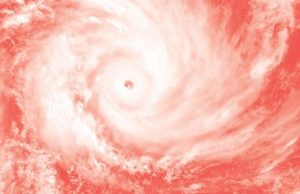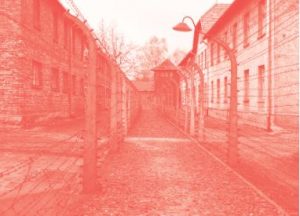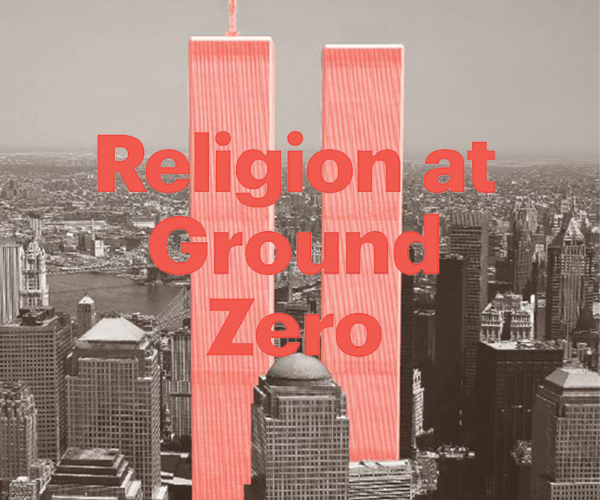By Christopher Craig Brittain ’96 (MDiv), ’02 (PhD), Dean of Divinity and Margaret E. Fleck Chair in Anglican Studies
It is a very strange experience to write about Religion at Ground Zero from my new office at Trinity College. For, by an odd coincidence, this course, which I have taught for almost 15 years, originated in this same office.
On the morning of September 11, 2001, I was a doctoral student at Trinity, sitting in what was then Professor Don Wiebe’s office. We were discussing an independent research course I was studying with him, when the Faculty secretary interrupted us to report that an airplane had just crashed into the World Trade Center. We both imagined that a small recreational plane had flown off course and had a tragic accident, and so we carried on with our meeting. When the secretary came in again to tell us about the second passenger plane, we knew immediately that the meeting was over.
For a few moments, Prof. Wiebe and I sat in stunned silence. Then he got up from his chair and reached for a book, pulled it out, and showed me the cover: it was an image of Osama bin Laden. “He’s the one behind this,” Prof. Wiebe declared, presciently. Then he looked at me and added, “It’s at times like these that I really have a problem with religious people.”
The conversations I had with other students and faculty members that day and in the days that followed had a strong impact on me. I encountered people I knew as kind and gentle who had been utterly transformed by their anger, calling for sweeping, irrational revenge against entire groups of people.
These experiences were what led me to begin to research religious responses to disasters and tragic events. For beyond the question of how it is possible for human beings to fly airplanes full of civilians into office towers, I was also confronted by another troubling question: How can ordinary people of deep faith be so quickly and utterly transformed into a violent rage that demands attacks on whole societies?

Such dilemmas led me to ask some difficult questions about my own religious tradition: How can a religious tradition that teaches peace and respect be used to justify murder? Why is it that people of faith seem no less prone to panic and desire for revenge? If religion is capable of causing such violence, can it nevertheless still be part of the solution to such tragedies?
As I thought about the events of 9/11, I realized that, as vivid as this murderous spectacle was, the issues it confronts us with are by no means new. Situations such as these terrorist attacks, and the way people react to them, have many unfortunate precedents in history. This realization led me to begin to study events as diverse as the Lisbon Earthquake of 1755, the First World War, the Holocaust, reactions to Hurricane Katrina, and many other subsequent disasters.
This research included exploring how the theological tradition has engaged with such events. The most common theological response to disasters and tragedies is to ask why a loving God would allow such terrible things to happen. People raise this question in a number of ways: “Where was God when I needed him?” “What did I do to deserve this?” Trying to find answers to these questions— an exercise formally called theodicy—has been the concern of philosophers and theologians for generations.
Yet, as I studied reactions to terrorism and to natural disasters, two things in particular struck me. The first observation is that many (perhaps even most) people caught up in a disaster tend not to find the answers provided by theodicy to be very helpful. Second, the temptation to engage in the sort of calculus modelled by theodicy remains very powerful, even among people who have no overt religious beliefs. In the wake of the shock of a terrible tragedy, many of those caught up in it lament that, “The world will never be the same!” This is quickly followed by a drive to identify who is to blame for causing the tragedy, and to articulate the meaning of what is being experienced.
My interest in these dynamics led me to begin teaching a course called Religion at Ground Zero, and this eventually resulted in a published book by that same title.
As I write this short article, many of the survivors of the recent hurricane and flooding in Texas, as well as the families and friends of the victims, are wrestling with the daunting and painful task of rebuilding their lives, as they ask the terrible question, “Why?” The same painful thoughts were no doubt experienced by mourners in Japan this past March, as they commemorated the sixth anniversary of the Fukushima disaster. A similar question surely still lingers with many in Barcelona, following the terrorist attack in July against civilians.

In the wake of such terrible events, many people struggle to achieve a sense of the meaning of their experiences. As those affected wrestle with such painful issues, the media and the general public undertake a similar process, but it is one that is frequently saturated with political controversy. The Hurricane Katrina disaster was followed by the spectacle of different officials passing the blame onto others, while reactions to the 2011 murders in Oslo by Anders Breivik were followed by a variety of politically motivated declarations: some assuming the attacks were caused by Muslim extremists, while an American radio commentator compared the young Labour Party victims to the Nazi Youth. Many people use the intensity of a disaster as an opportunity to advance their agendas and interests.
My research analyzes this dynamic and how emotive reactions to tragedies impact on the way religion is understood. My course studies theological responses to human tragedy and cultural shock, by focusing on popular reactions to the terrorist attacks of 7/7 in the U.K. and to the events of 9/11 in the U.S. It also examines Jewish responses to the Holocaust, and reactions to the 2004 tsunami in South-East Asia and the 2010 Earthquake in Haiti. We explore themes such as the question of the meaning of suffering, the function of religious discourse in the face of tragedy, and the relationship between religion and politics. Our conversation moves from these analyses to an exploration of the peril and promise of speaking of God in times of terror.
These discussions are concerned with the tension that exists between religion’s capacity to both cause and enhance the suffering and destruction surrounding historical tragedies, but also its potential to serve as a powerful resource for responding to such disasters. The role of belief, the difficulties of overcoming the influence of ideology, the formation of identity based on antagonistic us/them dualisms, and the significance of trust and humility are among the topics given attention.
My goal is to encourage students to reflect deeply on the difficulties of speaking of God in a time of terror. In the face of demands to “say something,” theologians and community leaders face the temptation to always speak positively in the face of a disaster. By describing theology as an act of “planned frustration” or “hoping against hope,” I argue that, sometimes, it is a mark of maturity to admit that not as much can be said about a situation as one would want to be able to say, and that one will not always be able to find the “magic words” that make everything feel better.
Unfortunately, current events continue to provide new catastrophes for my course to confront, with the result that, even after over a decade of teaching on this subject, it has yet to begin to feel tired or dated.
Sometimes it is suggested to me that spending so much time thinking about suffering and disaster must get very depressing. For me, the opposite has been the case— because every year, the passion and engagement with the topic by my students renews my hope for the world’s future.


Sorry, comments are closed for this post.